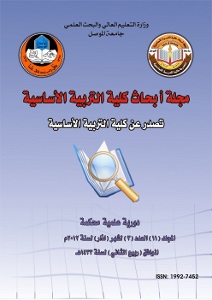Al-Qasimi’s Discretion in the Linguistic Interpretation of the Quran Through his Interpretation (Mahasin Al-Ta’weel) An Analytic Linguistic Study
Abstract
Al-Qasimis interpretation of the Glorious Quran (Mahasin Al-Taweel) has a remarkable effect on the discretion in the field of linguistic interpretation of the Glorious Quran. His discretions have been come out through four fields of discussions which are parsing, reference, rhetoric and the rhetorical interpretation. Al-Qasimi is of the view that ( ) has two possible parsing cases. The first case is that ( ) is an adjective to () and the second case is that it is an antecedent to (). The second possibility seems to have preponderance over the first one. As for the parsing of the sentence ( ) he sees it either a synthetic explicative or an interpretative synthetic whereas it is a conditional sentence the result clause of which is ( ). Al-Qasimi has mentioned that ( ) refers to the signs of victory and conquer whereas the correct view is that it refers to the day of resurrection. He also states that ( ) is a proper noun referring to any nation with numerous population and different races. The correct view is that ( ) refers to two tribes of the children of Adam and his offspring. He has mentioned that the rhetorical purpose of the predicate in ( ) is the declaring what upsets them and makes them regretful while it is probably a confirmation to what precedes it and fulfilling the punishment in the day of resurrection. Al-Qasimi has also referred to the possibility of using () and () interchangeably as a metaphor whereas they are probably used literally and when they are used as metaphor, they cannot be used interchangeably. He has shown that the preference of the verb () to the verb () is assigned to its additional meaning and its morphological strength but its rhetorical meaning refers to strength, enormousness and exaggeration. He also explains that the preference of the word ( ) to the word () is that it is a kind of honoring to the prophet (peace be upon him) and the first word suits his position rather than the other.
